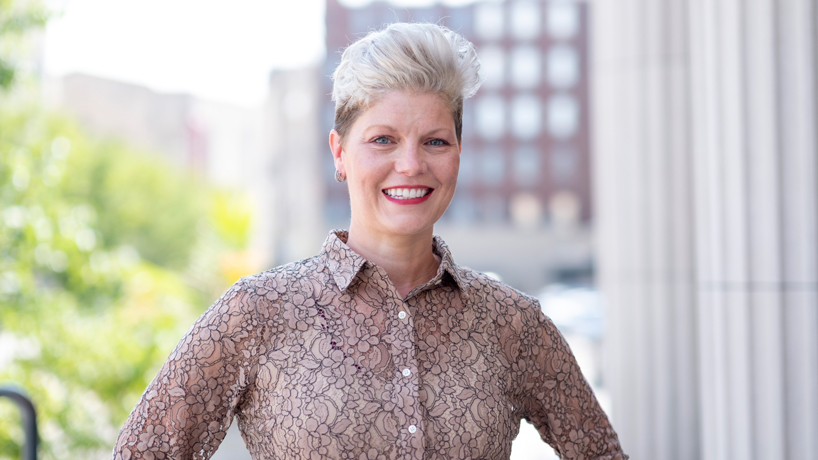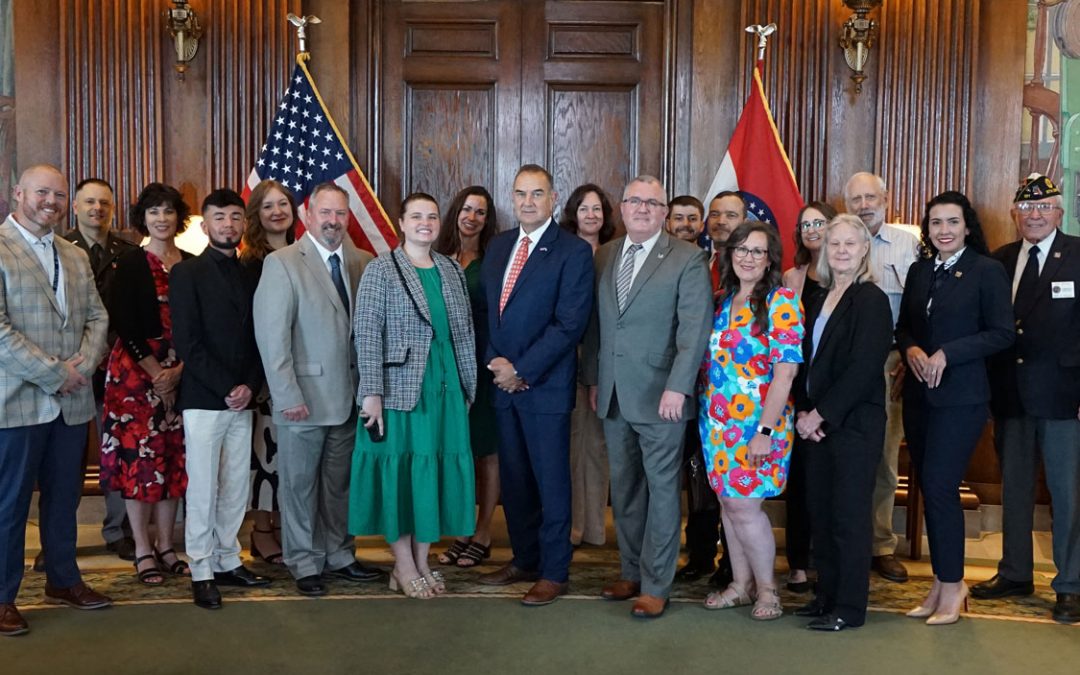
Emily Blackburn began working as a geospatial data analyst at UMSL’s Geospatial Collaborative after more than a decade leading the crime analysis unit at the St. Louis Metropolitan Police Department. (Photo by August Jennewein)
The University of Missouri–St. Louis continues to build its connections with the rapidly developing geospatial ecosystem that’s been sprouting up throughout St. Louis alongside construction of the National Geospatial-Intelligence Agency’s new west campus northwest of downtown.
That’s required adding staff to UMSL’s Geospatial Collaborative, which launched in 2020 to take advantage of the region’s growing expertise and facilitate collaboration with university researchers.
Alumna Emily Blackburn, who earned a master’s degree in criminology and criminal justice from UMSL in 2001, has signed on to serve as a geospatial data analyst after previously managing the crime analysis unit at the St. Louis Metropolitan Police Department since 2012.
She’s working alongside Geospatial Collaborative Director Will Werner to coordinate and develop UMSL initiatives and partnerships with defense, industry, workforce development and government sector leaders around the use of geospatial technologies, such as geographic information systems. Blackburn began her new role in mid-December.
“She essentially created and built the GIS strategy for the St. Louis Metropolitan Police Department,” Werner said. “Prior to her, it really didn’t exist. She built a lot of infrastructure for the city and for the police department. It was a great tool for them and really helped them navigate a lot of the resource allocation issues and focus areas that they should look at.”
Werner had previously worked with Blackburn during his own time at the police department, but he said he hadn’t learned she’d applied for the geospatial data analyst position until he was reviewing applications with the four-member search committee.
It was clear she was a strong candidate.
“One reason why I liked Emily a lot for this role was she had a very, very large breadth of experience, not just being into GIS, but she had experience working with imperfect datasets from the city and county,” Werner said. “She’s very familiar with the communities that we want to serve and that we want to help, and she knows a lot of the people in the region very well to be a partner and to be a person that we can utilize to help out going forward.”
He noted she’s also had a lot of experience working on research projects with faculty members, both at UMSL and at Southern Illinois University Edwardsville, where her husband, Dennis Mares – who received his PhD from UMSL in 2004 – is a professor of criminal justice.
“Obviously, we want to be able to provide a geospatial or GIS service for the researchers and the professors on campus,” Werner said. “The researcher doesn’t have to try to become an expert in GIS. They have the opportunity to lean on people that already are experts, so they can focus on wherever their major area of expertise is – whether it’s history or criminal justice or psychology or whatever.”
That excites Blackburn.
“I worked at the police department for a long time and had a really good last couple of years, but I was getting burned out and doing the same sort of thing or dealing with the same data all the time,” she said. “In this role, I can work with everything from administrative data to whatever research comes along with the various colleges that we have. It’s going to allow me to use some of the same tools and skills I have but across a broader data set. I thought that sounded really interesting.”
Blackburn didn’t realize how much she’d enjoy returning to some of her roots at UMSL. She brought her 8-year-old son with her to campus to pick up her laptop and other information for her new role, and she found herself reminiscing.
“I’m like, ‘Look, here’s where I met your dad, and there’s where I did this,’” she said. “It was a lot of fun. I definitely have fond memories, and it’s fun to go back.”
But now her focus is on helping create something new.
Blackburn’s position is partially funded by Rise Community Development, a partner with UMSL’s Community Innovation and Action Center. Rise works on neighborhood revitalization and development, providing consulting and data-driven guidance on neighborhood redevelopment projects. She spent much of her first two months completing some time-sensitive projects for Rise.
Lately, she’s been spending more time working with Karl Guenther and Prima Wagan in the Office of Research and Economic and Community Development and trying to figure out how she can best assist faculty members in their research.
GIS has applications for many different projects, helping aid understanding of complex data.
“I can hand you a spreadsheet or a phone book, and it’s not that informative, right?” Blackburn said. “It’s boring, and it’s rows and rows of data. But if we can look at a map or a graph and see how the data goes up and down, it’s easier to grasp. We might have data from the country or the state, but what about my block or my neighborhood? If we can use a couple of toggles and really look at what’s important to us, that changes our entire understanding of what’s going on.”
Several faculty members from the criminology and criminal justice, economics, political science and psychological sciences have already reached out to her to see how they might make use of GIS tools, but Blackburn is committed to having more of those conversations and getting researchers to take advantage of her expertise. She’s scheduled to speak at a brown bag lunch event on Friday and is planning additional outreach opportunities with individual departments.
“We’re here for the university, and they should use us,” Blackburn said. “I always worry about hesitancy. I had this in my last job, too. ‘Oh, I’m not going to call; they’re so busy. Or I don’t want to bother them.’ Bother us. The worst thing we can say is that we can’t help, but I doubt that’ll happen.”














